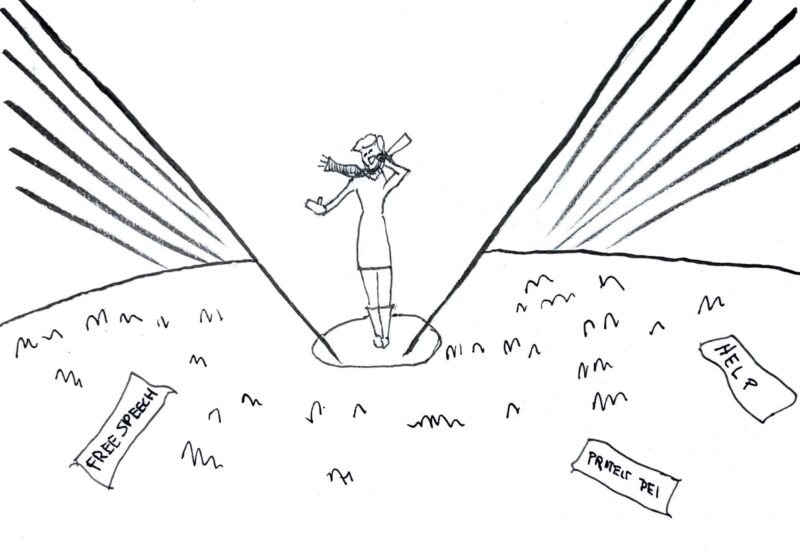The All-Campus Judicial Committee ruled last week that five candidates should be added to the senate election ballot “with all possible speed” and, if possible, without delaying elections. Elections were delayed six days by the Senate Elections Committee and will now take place next Monday to Wednesday, April 1-3.
Because the election dates were moved, questions have been raised by ACJC as to whether the elections committee ignored their ruling.
“In my time on ACJC, I have no recollection of anyone disobeying an order,” senior and ACJC Chief Justice Ryan Walters said. “The student government has broken down. If they don’t follow the [SA] constitution, they are subverting it.”
Although senate elections were delayed almost a full week, elections for Speaker of the Students’ Association Senate will proceed as scheduled on Monday. Traditionally, the speaker is elected by the new senate body, but if elections take place as planned, the exiting senators will elect next year’s speaker.
Current speaker Bronwen Van Hooft, a senior, explained that the senate would be best served by holding speaker elections as quickly as possible, regardless of senate election dates.
“In order to pick someone who can hit the ground running when their term begins it is important to choose them as soon as possible,” Van Hooft said.
SA President and junior John LaBoda believes that the incoming senators should have the opportunity to elect their own speaker. “Every senate gets a chance to elect their speaker, and this group won’t have it. This is a complete anomaly – something that needs to be corrected.”
ACJC ruling
Five of the students who missed the March 18 election meeting petitioned ACJC to be allowed on the ballot, claiming that the deadline established by the elections committee was arbitrary and unfair, and that the elections committee violated SA bylaws by failing to publicize that deadline.
ACJC dismissed the petitioner’s first claim, but upheld their second contention on the grounds that a “reasonable person” would conclude that the elections committee failed to publicize sufficiently. The decision found that the elections committee failed to post flyers sufficiently in advance of initial interest meetings and failed to inform students that attendance at these meetings was mandatory.
Walters felt that the decision was justified. “People should have had more notice,” he said. He also questioned the uniformity of the information provided in the flyers. “Some said mandatory, some didn’t,” he said.
Senate argued that the entire campus was notified in the same way and that the potential candidates should have demonstrated more active interest. “The expectation is that if people are interested in running for senate they’ll attend a meeting or contact us by e-mail,” senior and member of the elections committee Ashley Conner said.
ACJC’s ruling ordered the elections committee to immediately instruct their programmer to add the names and platforms of the petitioners to the ballot and to delay the election only if the petitioners could not be added before the scheduled election, which was to take place March 26 – March 28. The order stated that elections were only to be delayed “only until such time as the revised ballot was prepared.”
“We didn’t think they needed additional time,” Walters said. “[The petitioners] didn’t ask for time.”
The candidates added to the ballot were pleased with the ruling. “I think we got what we were looking for, which was to be added to the ballot,” freshman and petitioner Ilana Kaplan-Shain said. “ACJC saw what happened and they corrected the situation.”
Junior and Election Committee Chair Santo Marciano was surprised at the ruling. “To be honest, I did not think they would rule that way,” he said. “The facts were quite obvious. This decision definitely wasn’t fair to the original candidates because they did everything we asked and went through the right channels.”
Most candidates who were already on the ballot, however, said that there were minor inconveniences in the way the decision was instituted, but that the decision was a fair one. “The action was done in the key interest of being fair,” sophomore and At-Large candidate J.R. Santana Carter said. “We have to take the good with the bad.”
Some agreed with the petitioners that the advertising was not sufficient. “The only reason I knew [about the elections] is because I have a good friend who is already on Senate,” freshman and Class of 2005 candidate Evan Kaderbeck said.
Others disagreed on this point. “I feel that senate didn’t have to go out and use a blowhorn to let everyone know that senate elections were going on,” freshman and Class of 2005 candidate Mubarek Said said.
Junior and Class of 2003 candidate Eric Dubowsky said that he felt that ACJC’s decision was extremely unfair to the candidates who attended the original meetings because the new candidates received free publicity.
“This is an unfair advantage because it has only publicized these candidates,” he said. “I put a week of work into my campaign and feel it is unfortunate the way this has gone.”
Senate implementation
One of ACJC’s stipulations was that the additional names and platforms be placed on the ballot as soon as possible. Senate, however, set election dates at last Monday’s senate meeting before they consulted with their ITS programmer, Christina Plummer, on Tuesday.
At issue was whether it was physically possible to include the new candidates and their platforms immediately and hold elections from Wednesday March 27 to Friday March 29. Consideration was also made for whether the election would carry over to the weekend.
Plummer said that moving the elections would make it difficult to run the election without doing it over the weekend. Regarding ACJC’s decision, she said it was “never really discussed” when senate approached her about changing the election dates to next Monday through Wednesday, rather than at the end of this week.
Walters believes it would have been possible. “If they really wanted to hold the elections on Wednesday through Friday, they could have found a way to do it,” Walters said.
The election committee said that they were aware of Plummer’s schedule and had an idea of when it would be possible to hold elections. Marciano said that she was aware of ACJC’s decision, but that the decision was only discussed “a little bit” when they approached her.
Plummer had not received the additional platforms as of last night.
Most candidates seemed unaware that there was a possible violation of the ruling. “I have no reason to complain about the election committee’s action at this point,” sophomore and Class of 2004 candidate Rajen Subramanian said. Subramanian was not at the March 18 meeting, but was included on the original ballot because he had made prior contact by e-mail with the elections committee.
ACJC considered holding the election committee in contempt because of their apparent disregard of the ruling, but later decided not to take this action.
Walters felt that senate ignored the second part of their ruling, which called for speedy action. “In my time on ACJC, I have no recollection of anyone disobeying an order [in a student government case],” he said.
After ACJC reviewed senate’s reasoning, they determined that the election committee’s explanation of the delay was sufficient.
“It’s not a question that they didn’t follow the exact letter of our decision,” Walters said. “What we came up with makes sense, but we also see where the election committee is coming from.”
Walters said that the election committee was concerned about scheduling the election in conflict with upcoming weekend holidays and that they told him that some members of the committee would be gone on Friday.
Walters, however, also believes that the elections may be better handled by another group. “I personally believe that the Student Activities Office should take over el
ections,” he said.
The election committee stood by their interpretation of the ruling. “We followed the decisions as best we could,” Marciano said.
Speaker elections
As a result of the move of the senate election dates to Monday through Wednesday, speaker elections will now take place before the elections for senators will be complete. This means that outgoing senators will be electing a speaker who will serve the new senators.
In contrast to the senate election, the speaker election is handled within the senate body rather than the entire student body. Because the speaker advocates the ideas of the senate rather than his or her own agenda, the speaker does not have to be a member of senate.
The date of the speaker election is determined by the outgoing speaker and Van Hooft said that she had planned to hold the election on Monday before the senate election was changed. She considered postponing the speaker election after the ACJC decision, but decided not to do so for several reasons.
Van Hooft said that the transition period from the old speaker to the new one is key. “It is important to have time to learn the job,” she said. “Unless you’re actually doing the job, it’s hard to know about it.”
She also cited the fact that senate passed a bylaw change earlier this semester allowing ACJC to select its Chief Justice and associate Chief Justice before new members were selected. She also believes that because the speaker’s job is to merely “represent the viewpoint of senate,” the speaker’s job remains the same regardless of who the senators are.
La Boda believes that since senate elections were postponed for a week, speaker elections should similarly be changed. “The progression of events is more important than the dates,” he said.
Though Conner is the only official candidate for speaker, La Boda declared his intentions to run in a letter to the Campus Times. He will run on the platform that if he is elected, he will resign a week later so incoming senators will be able to elect their own speaker.
“Whoever is running for senate, it destroys their credibility being elected under these circumstances,” he said.
La Boda has challenged anyone who runs against him to also step down and be reelected by the new group.
Walters said he sees no reason why Van Hooft’s decision to carry out speaker elections is a violation. “I see no basis for challenging the speaker elections,” he said.
Voter Response
Low voter turnout has been a perpetual problem at UR and these changes could have an effect.
Marciano is hopeful that turnout will increase. “I hope we get a higher voter turnout because of the additional PR,” he said.
Freshman Colleen Kavanagh said that the additional publicity has increased her awareness of the senate race. “I might not have voted without the scandal,” she said. “It got my attention. I wouldn’t have known about it otherwise.”
Some candidates worried that voter turnout would decrease with the change. “There was a poor turnout to start with,” Dubowsky said. “This is an inconvenience to students who will be voting.”
The rescheduling of the election has also resulted in confusion among students. “I tried voting earlier today, but I didn’t know when they were rescheduled,” junior Patrick Russeau said.
Freshman and Class of 2005 candidate agreed. “It is harder to know when, where and how to vote,” he said.
How to vote
Elections will take place from 10 a.m. on Monday, April 1 to 10 p.m. on Wednesday April 3.
Voting will be done through Telnet, a mail server that is unfamiliar to many freshmen, who use Webmail instead to access their student accounts. “I have no idea how to vote,” freshman Ashley Stringham said.
To remedy this problem, the election committee will provide a help booth in Wilson Commons with instructions on how to vote and computers for students to use. The booth will be open from 10 a.m. to 10 p.m. each day of the election.
Students can vote using Telenet by typing the word “vote” at the mail prompt.
Taylor can be reached at Ktaylor@campustimes.org.DeSantis can be reached at Kdesantis@campustimes.org.



